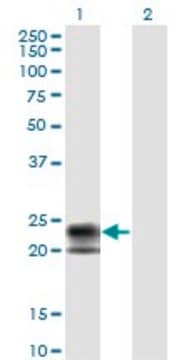SRP3010
BCMA human
recombinant, expressed in E. coli, ≥98% (SDS-PAGE), ≥98% (HPLC), suitable for cell culture
Sinonimo/i:
B-Cell Maturation Antigen, BCM, TNFRSF17
Scegli un formato
Scegli un formato
About This Item
Prodotti consigliati
Origine biologica
human
Ricombinante
expressed in E. coli
Saggio
≥98% (HPLC)
≥98% (SDS-PAGE)
Stato
lyophilized
PM
5.3 kDa
Confezionamento
pkg of 20 μg
tecniche
cell culture | mammalian: suitable
Impurezze
<0.1 EU/μg endotoxin, tested
N° accesso UniProt
Condizioni di spedizione
wet ice
Temperatura di conservazione
−20°C
Informazioni sul gene
human ... TNFRSF17(608)
Descrizione generale
Azioni biochim/fisiol
Sequenza
Stato fisico
Ricostituzione
Codice della classe di stoccaggio
11 - Combustible Solids
Classe di pericolosità dell'acqua (WGK)
WGK 3
Scegli una delle versioni più recenti:
Possiedi già questo prodotto?
I documenti relativi ai prodotti acquistati recentemente sono disponibili nell’Archivio dei documenti.
Active Filters
Il team dei nostri ricercatori vanta grande esperienza in tutte le aree della ricerca quali Life Science, scienza dei materiali, sintesi chimica, cromatografia, discipline analitiche, ecc..
Contatta l'Assistenza Tecnica.








